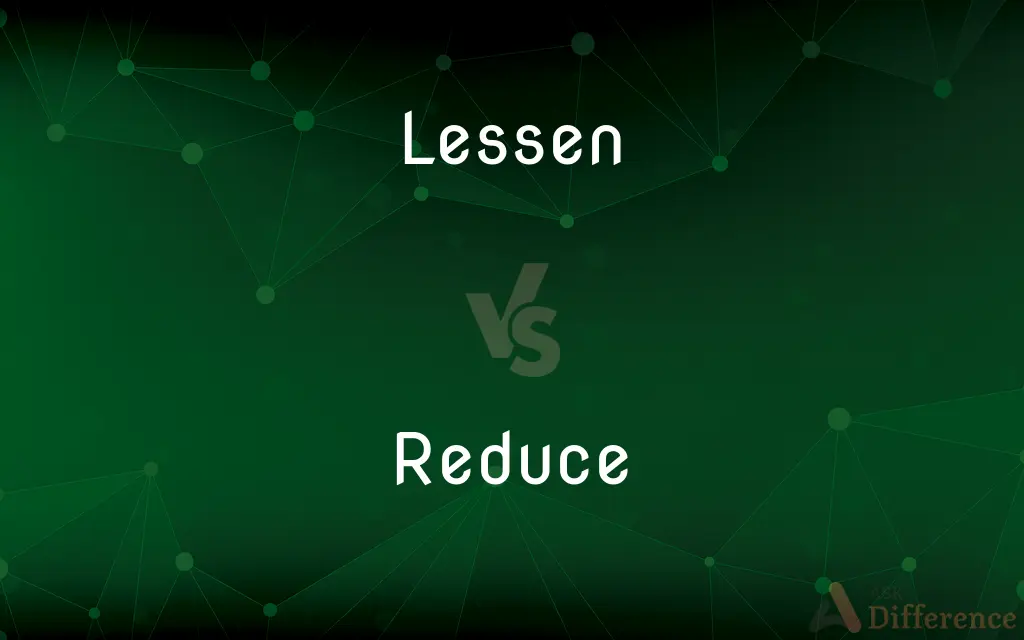Lessen vs. Reduce — What's the Difference?
Edited by Tayyaba Rehman — By Fiza Rafique — Updated on April 1, 2024
Lessen means to make or become less in degree, intensity, or value, while reduce involves decreasing size, amount, or extent.

Difference Between Lessen and Reduce
Table of Contents
ADVERTISEMENT
Key Differences
Lessen is typically used when referring to the decrease in intangible qualities, such as pain, burden, or difficulty, suggesting a subtle or gradual decrease. On the other hand, reduce is often applied to tangible or quantifiable changes, like reducing weight, prices, or production, implying a more measurable adjustment.
While lessen can imply a reduction that doesn't necessarily result in a significant change or removal, reduce tends to imply a more substantial decrease, often with the goal of minimizing or eliminating something. For example, lessening one's workload might imply managing it better, whereas reducing one's workload suggests cutting down the number of tasks significantly.
In some contexts, lessen is used to denote a decrease in severity or intensity, such as lessening the impact of a problem, which focuses on mitigating effects rather than decreasing quantity. Conversely, reduce can be used in contexts involving waste management or consumption, emphasizing a strategic cutback in use or production.
The verb lessen might be chosen for changes that are either temporary or perceived as less direct, while reduce is more definitive, often used in formal or technical contexts to indicate direct action towards minimization or diminution.
Despite these nuances, in many instances, lessen and reduce can be used interchangeably, especially when the distinction between tangible and intangible is blurred. Both contribute to the broader concept of making something smaller in size, amount, degree, or importance.
ADVERTISEMENT
Comparison Chart
Typical Context
Decrease in intangible qualities
Decrease in size, amount, or extent
Implication
Subtle or gradual decrease
Substantial or measurable decrease
Focus
Severity or intensity
Quantity or tangible aspects
Usage Contexts
Mitigation, management of effects
Strategic cutbacks, formal reports
Nature of Change
Temporary or less direct
Definitive, with a goal of minimization
Compare with Definitions
Lessen
To make less in amount, degree, or severity.
Meditation can lessen the effects of stress.
Reduce
To bring down to a smaller size, amount, or degree.
Recycling helps reduce waste.
Lessen
To become smaller or less important.
The pain lessened after taking medication.
Reduce
To diminish in importance or severity.
Budget cuts have reduced the program's effectiveness.
Lessen
To diminish in size, quantity, or extent.
The shadows lessened as the day grew bright.
Reduce
To lower in rank or grade.
He was reduced from manager to assistant.
Lessen
To decrease the influence or impact of something.
His apology lessened her anger.
Reduce
To condense or abbreviate a text or statement.
The report was reduced to a one-page summary.
Lessen
To reduce the strength or intensity of something.
Dimming the lights lessens eye strain.
Reduce
To decrease the volume or amount by physical or chemical means.
Cooking reduces the moisture content in food.
Lessen
To make less; reduce.
Reduce
To bring down, as in extent, amount, or degree; diminish.
Lessen
(Archaic) To make little of; belittle.
Reduce
To gain control of; subject or conquer
"a design to reduce them under absolute despotism" (Declaration of Independence).
Lessen
To become less; decrease
Interest that lessened as the lecture continued.
Reduce
To subject to destruction
Enemy bombers reduced the city to rubble.
Lessen
(transitive) To make less; to diminish; to reduce.
Reduce
To bring to a specified undesirable state, as of weakness or helplessness
Disease that reduced the patient to emaciation.
Teasing that reduced the child to tears.
Lessen
(intransitive) To become less.
Reduce
To compel to desperate acts
The Depression reduced many to begging on street corners.
Lessen
Unless.
Reduce
To lower in rank or grade; demote.
Lessen
To make less; to reduce; to make smaller, or fewer; to diminish; to lower; to degrade; as, to lessen a kingdom, or a population; to lessen speed, rank, fortune.
Charity . . . shall lessen his punishment.
St. Paul chose to magnify his office when ill men conspired to lessen it.
Reduce
To thicken or intensify the flavor of (a sauce, for example) by slow boiling.
Lessen
To become less; to shrink; to contract; to decrease; to be diminished; as, the apparent magnitude of objects lessens as we recede from them; his care, or his wealth, lessened.
The objection lessens much, and comes to no more than this: there was one witness of no good reputation.
Reduce
To lower the price of
The store has drastically reduced winter coats.
Lessen
Decrease in size, extent, or range;
The amount of homework decreased towards the end of the semester
The cabin pressure fell dramatically
Her weight fall to under a hundred pounds
His voice fell to a whisper
Reduce
To decrease the viscosity of (paint, for example), as by adding a solvent.
Lessen
Make smaller;
He decreased his staff
Reduce
To put in a simpler or more systematic form; simplify or codify
Reduced her ideas to a collection of maxims.
Lessen
Wear off or die down;
The pain subsided
Reduce
To turn into powder; pulverize.
Reduce
To decrease the valence of (an atom) by adding electrons.
Reduce
To remove oxygen from (a compound).
Reduce
To add hydrogen to (a compound).
Reduce
To change to a metallic state by removing nonmetallic constituents; smelt.
Reduce
(Mathematics) To simplify the form of (an expression, such as a fraction) without changing the value.
Reduce
(Medicine) To restore (a fractured or displaced body part) to a normal condition or position.
Reduce
(Linguistics) To pronounce (a stressed vowel) as the unstressed version of that vowel or as schwa.
Reduce
To become diminished.
Reduce
To lose weight, as by dieting.
Reduce
(Biology) To undergo meiosis.
Reduce
(transitive) To bring down the size, quantity, quality, value or intensity of something; to diminish, to lower.
To reduce weight, speed, heat, expenses, price, personnel etc.
Reduce
(intransitive) To lose weight.
Reduce
(transitive) To bring to an inferior rank; to degrade, to demote.
To reduce a sergeant to the ranks
Reduce
(transitive) To humble; to conquer; to subdue; to capture.
To reduce a province or a fort
Reduce
(transitive) To bring to an inferior state or condition.
To reduce a city to ashes
Reduce
To decrease the liquid content of food by boiling much of its water off.
Reduce
To add electrons / hydrogen or to remove oxygen.
Formaldehyde can be reduced to form methanol.
Reduce
To produce metal from ore by removing nonmetallic elements in a smelter.
Reduce
To simplify an equation or formula without changing its value.
Reduce
To express the solution of a problem in terms of another (known) algorithm.
Reduce
To convert a syllogism to a clearer or simpler form.
Reduce
To convert to written form. (Usage note: this verb almost always appears as "reduce to writing".)
It is important that all business contracts be reduced to writing.
Reduce
To perform a reduction; to restore a fracture or dislocation to the correct alignment.
Reduce
To reform a line or column from (a square).
Reduce
To strike off the payroll.
Reduce
To annul by legal means.
Reduce
To translate (a book, document, etc.).
A book reduced into English
Reduce
To bring or lead back to any former place or condition.
And to his brother's house reduced his wife.
The sheep must of necessity be scattered, unless the great Shephered of souls oppose, or some of his delegates reduce and direct us.
Reduce
To bring to any inferior state, with respect to rank, size, quantity, quality, value, etc.; to diminish; to lower; to degrade; to impair; as, to reduce a sergeant to the ranks; to reduce a drawing; to reduce expenses; to reduce the intensity of heat.
Nothing so excellent but a man may fasten upon something belonging to it, to reduce it.
Having reducedTheir foe to misery beneath their fears.
Hester Prynne was shocked at the condition to which she found the clergyman reduced.
Reduce
To bring to terms; to humble; to conquer; to subdue; to capture; as, to reduce a province or a fort.
Reduce
To bring to a certain state or condition by grinding, pounding, kneading, rubbing, etc.; as, to reduce a substance to powder, or to a pasty mass; to reduce fruit, wood, or paper rags, to pulp.
It were but rightAnd equal to reduce me to my dust.
Reduce
To bring into a certain order, arrangement, classification, etc.; to bring under rules or within certain limits of descriptions and terms adapted to use in computation; as, to reduce animals or vegetables to a class or classes; to reduce a series of observations in astronomy; to reduce language to rules.
Reduce
To change, as numbers, from one denomination into another without altering their value, or from one denomination into others of the same value; as, to reduce pounds, shillings, and pence to pence, or to reduce pence to pounds; to reduce days and hours to minutes, or minutes to days and hours.
Reduce
To add an electron to an atom or ion.
Reduce
To restore to its proper place or condition, as a displaced organ or part; as, to reduce a dislocation, a fracture, or a hernia.
Reduce
Cut down on; make a reduction in;
Reduce your daily fat intake
The employer wants to cut back health benefits
Reduce
Make less complex;
Reduce a problem to a single question
Reduce
Bring to humbler or weaker state or condition;
He reduced the population to slavery
Reduce
Simplify the form of a mathematical equation of expression by substituting one term for another
Reduce
Lower in grade or rank or force somebody into an undignified situation;
She reduced her niece to a servant
Reduce
Be the essential element;
The proposal boils down to a compromise
Reduce
Reduce in size; reduce physically;
Hot water will shrink the sweater
Can you shrink this image?
Reduce
Lessen and make more modest;
Reduce one's standard of living
Reduce
Make smaller;
Reduce an image
Reduce
To remove oxygen from a compound, or cause to react with hydrogen or form a hydride, or to undergo an increase in the number of electrons
Reduce
Narrow or limit;
Reduce the influx of foreigners
Reduce
Put down by force or intimidation;
The government quashes any attempt of an uprising
China keeps down her dissidents very efficiently
The rich landowners subjugated the peasants working the land
Reduce
Undergo meiosis;
The cells reduce
Reduce
Reposition (a broken bone after surgery) back to its normal site
Reduce
Reduce in scope while retaining essential elements;
The manuscript must be shortened
Reduce
Be cooked until very little liquid is left;
The sauce should reduce to one cup
Reduce
Cook until very little liquid is left;
The cook reduced the sauce by boiling it for a long time
Reduce
Lessen the strength or flavor of a solution or mixture;
Cut bourbon
Reduce
Take off weight
Common Curiosities
Can lessen and reduce be used interchangeably?
While they have nuanced differences, in many cases, lessen and reduce can be used interchangeably, especially when the distinction between tangible and intangible decreases is not strict.
Is reduce more severe than lessen?
Reduce often implies a more significant or substantial decrease, making it appear more severe in some contexts.
Does reduce imply a complete elimination?
Reduce implies a significant decrease, but not necessarily a complete elimination, unless specifically stated.
Which term is more suitable for a formal report: lessen or reduce?
Reduce is often preferred in formal or technical contexts due to its implication of measurable and substantial decreases.
What is the main difference between lessen and reduce?
Lessen often refers to decreasing intangible qualities subtly, while reduce involves a measurable decrease in size, amount, or extent.
Is lessen always a gradual process?
Lessen usually implies a more subtle or gradual process, but it can also occur relatively quickly, depending on the context.
How does the choice between lessen and reduce affect the perception of change?
Using lessen may suggest a more subtle or manageable change, while reduce could indicate a more decisive or significant action.
Can the impact of an action be lessened without reducing its scale?
Yes, the impact can be lessened through mitigation strategies without necessarily reducing the scale of the action or event.
Does reducing something always require direct action?
Yes, reducing something typically involves direct action or intervention aimed at decreasing size, quantity, or importance.
Can lessen be used in a physical context?
While less commonly used for physical quantities, lessen can still be applied, especially when emphasizing a decrease in severity or intensity.
What does it mean to reduce a recipe?
To reduce a recipe means to decrease the quantity of ingredients used, adjusting for a smaller yield, or it can mean to simmer a liquid until it diminishes in volume.
Is it appropriate to use reduce when talking about feelings or emotions?
While not as common, reduce can be used for feelings or emotions, especially when implying a significant decrease in intensity.
How do lessen and reduce relate to environmental sustainability?
Both terms are relevant; lessen can refer to mitigating impacts on the environment, while reduce often refers to concrete actions to decrease waste, energy use, or resource consumption.
Can a company lessen its expenses without reducing its workforce?
Yes, a company can lessen expenses through various strategies, like improving efficiency or cutting non-labor costs, without necessarily reducing its workforce.
Is lessen used more in a temporary context?
Lessen can imply both temporary and permanent changes, but it often suggests a less permanent state compared to reduce.
Share Your Discovery

Previous Comparison
Mafia vs. Mob
Next Comparison
Grab vs. TakeAuthor Spotlight
Written by
Fiza RafiqueFiza Rafique is a skilled content writer at AskDifference.com, where she meticulously refines and enhances written pieces. Drawing from her vast editorial expertise, Fiza ensures clarity, accuracy, and precision in every article. Passionate about language, she continually seeks to elevate the quality of content for readers worldwide.
Edited by
Tayyaba RehmanTayyaba Rehman is a distinguished writer, currently serving as a primary contributor to askdifference.com. As a researcher in semantics and etymology, Tayyaba's passion for the complexity of languages and their distinctions has found a perfect home on the platform. Tayyaba delves into the intricacies of language, distinguishing between commonly confused words and phrases, thereby providing clarity for readers worldwide.














































